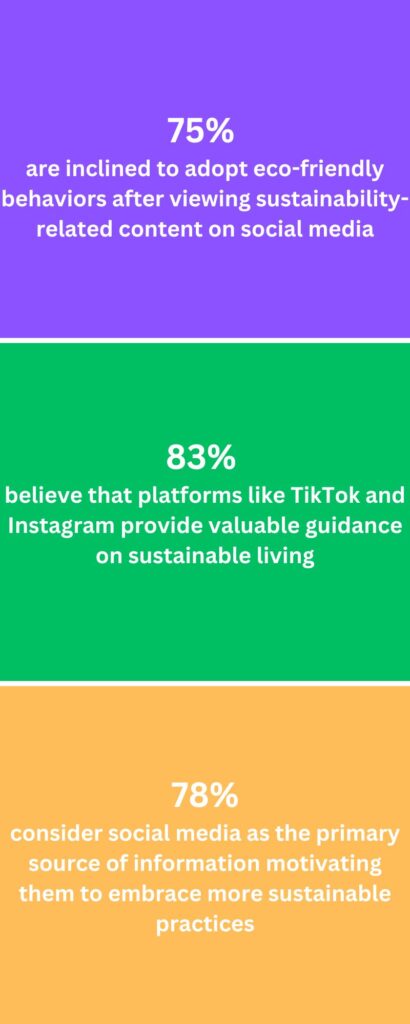Green, Greener, Greenest: How Your Business Can Promote Sustainability Through Social Media

This is how social media can help businesses spread their sustainability.
Table of Contents
Introduction
In an increasingly interconnected world, the power of social media has proven to be a double-edged sword. While it can amplify the dissemination of misinformation and foster divisiveness, it can also be a powerful tool for promoting sustainability. The ability to connect, educate, and mobilize individuals and communities on a global scale has made social media a crucial player in the quest for a sustainable future.
What the data is saying?
Unilever has collaborated with a prominent behavioral science institution globally to investigate how social media content influences individuals to adopt sustainable decision-making.

Social media can be used in many ways to promote sustainability
Promoting Sustainability through Social Media
To advance sustainability via social media marketing, businesses can divulge their eco-friendly initiatives to their customer base. This approach not only allows them to demonstrate their dedication to sustainable practices but also appeals to customers who prioritize environmentally responsible choices. Here are some instances of sustainable practices that businesses can spotlight on social media:
- Utilizing renewable energy sources
- Enforcing recycling programs
- Minimizing waste through eco-friendly or minimal packaging
- Sourcing materials from sustainable suppliers
- Backing local and organic agriculture
- Employing energy-efficient equipment
Furthermore, sharing these sustainable endeavors on social media can help businesses cultivate a robust brand image and bolster customer loyalty. Consumers are more inclined to support companies that prioritize sustainability and align with their values. This can ultimately result in heightened sales and increased brand advocacy.
Promoting Sustainability with Environmentally Conscious Language
In their social media marketing efforts, businesses can champion sustainability by incorporating eco-friendly language. This strategy effectively communicates their dedication to sustainability and resonates with eco-conscious customers. Examples of eco-friendly terminology encompass:
- Sustainable
- Eco-friendly
- Green
- Low environmental impact
- Recyclable
- Compostable
- Biodegradable
- Non-harmful
Employing eco-friendly language serves as a means to attract customers who prioritize sustainability while underscoring a company’s commitment to environmental stewardship.
Fostering Collaborative Alliances with Sustainability Organizations
To magnify their sustainability endeavors on social media, businesses can form partnerships with organizations that align with their values. Through these collaborations, businesses can extend their influence, enabling them to have a more substantial influence in promoting sustainable practices.
Teaming up with sustainability organizations is a mutually advantageous strategy. Showcasing these alliances on social media can serve as an inspirational example for others, encouraging them to follow suit and collectively contribute to a more sustainable future.
Promoting Sustainable Behavior
Businesses can leverage the influential reach of social media to inspire conscious choices that contribute to a more environmentally friendly world. By featuring eco-friendly products and services and offering educational content, businesses can empower their customers to adopt more mindful behaviors.
Here are ways in which businesses can encourage sustainable behavior through social media:
- Showcasing Sustainable Products and Services: For instance, a beauty brand can spotlight its eco-friendly packaging or ingredients. This not only highlights the brand’s commitment to sustainability but also encourages customers to make choices that resonate with their values.
- Sharing Practical Tips and Tricks: A fashion retailer can post about upcycling old clothing or reducing textile waste. By providing actionable steps, businesses can assist customers in making a positive environmental impact.
- Supporting Environmental Causes and Initiatives: Companies can disseminate information and updates on sustainability-related events, campaigns, and charitable organizations. This fosters a sense of community and motivates customers to engage in meaningful actions to drive change.
Pros of Using Social Media Sustainability
Social Media and Promoting Transparency
Social media offers a potent avenue for businesses to practice transparency when it comes to their sustainability efforts. Companies can utilize these platforms to disseminate information regarding their environmental and social influence, encompassing aspects like their carbon footprint, waste reduction strategies, and social responsibility endeavors.
Through transparent communication, businesses can forge trust with their stakeholders, bolster their brand identity, and resonate with customers, investors, and employees.
Enhancing Accountability and Advancing Through Social Media
The sustainability movements witnessed on social media wield significant influence in holding companies accountable, particularly those failing to meet their sustainability commitments.
Businesses can approach this by shining a light on those within their industry who fall short of sustainable standards while simultaneously promoting their own principled stance and initiatives. By directing their focus toward unsustainable competitors and acknowledging broader issues, companies can align themselves with the values of the public and consumers while exerting pressure on organizations to modify their conduct.
Utilizing Social Media for Information Dissemination
Social media platforms offer a swift and effective means for companies to broadcast information regarding their sustainability endeavors to a broad and diverse audience.
Businesses can harness social media to distribute updates concerning their sustainability initiatives, promote events, and share pertinent sustainability-related news and research.
This approach also serves as a cost-effective and environmentally-friendly alternative to traditional marketing methods. The reduced cost empowers organizations to experiment with their communication style, increase their posting frequency, and reach previously untapped audiences.
Fostering Mindful Consumption via Social Media
Brands can employ social media as a smart tool to advocate for more conscious consumerism. Instead of merely promoting excessive buying, this approach enables companies to emphasize the value of their products by highlighting their use of durable, sustainable materials or their provision of repair services.
Through posts, companies can educate their followers about the environmental and ethical implications of their purchases, ultimately encouraging the adoption of more responsible consumption habits. This is particularly influential in industries like fashion, which often faces criticism for its culture of overconsumption.
Cons Of Using Social Media Sustainability
Deceptive Sustainability Promotion on Social Media
Greenwashing stands as a significant challenge in the realm of sustainability promotion through social media. It provides businesses with the opportunity to issue unfounded or misleading claims about their environmental friendliness or ethical practices.
Common tactics involve employing ambiguous terms such as ‘green innovation’ without providing concrete details or even outright neglecting the climate crisis. With social media increasingly being a platform for spreading climate misinformation and falsehoods, it is crucial for businesses to take ownership and responsibility for the sustainability messages they convey on their social media platforms.
Fake News
Information travels swiftly on social media, with posts capable of going viral in mere minutes, being shared across various platforms, and propagated through messaging apps. Unfortunately, this rapid dissemination also facilitates the swift spread of false news.
Misinformation pertaining to climate change can significantly erode the credibility of companies that are actively promoting their sustainability endeavors. Brands must strategically position themselves to both sway consumer perceptions, spotlight their sustainability initiatives, and counteract the deluge of misleading environmental information.
Government Oversight of Social Media and Sustainability Claims
In recent years, there has been a growing demand for government intervention to regulate businesses’ sustainability campaigns, primarily aimed at curbing greenwashing and addressing the role of social media in influencing sustainability efforts.
Brands may find themselves under increased scrutiny for their messaging, with the Federal Trade Commission (FTC) already issuing a set of ‘Green Guides’ that necessitate organizations to substantiate their environmental claims with sound and credible scientific evidence.
How does The Disposal Company spread awareness?
The Disposal Company (TDC) helps many brands to beat plastic pollution through its plastic-neutrality scheme. Also, TDC is organizing live sessions with many renowned influencers to spread awareness of sustainable living, upcycling, sustainable lifestyle hacks, and many more. Check here.
Conclusion
Realizing the full potential of social media in sustainability requires active and critical engagement. It demands discernment in distinguishing reliable information from misinformation, a commitment to translating online awareness into offline action, and a conscious effort to foster diverse and inclusive conversations.
India’s first climate action platform, The Disposal Company, is paving the way for a greener future by providing brands with the tools they need to achieve plastic neutrality and carbon neutrality. Learn more here.




